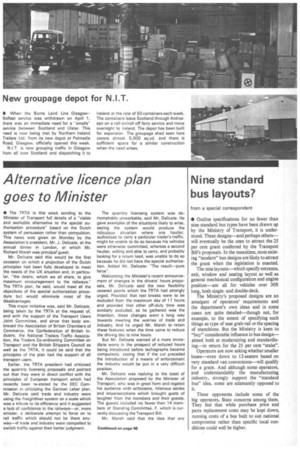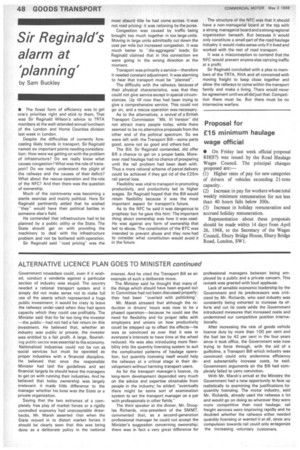Alternative licence plan goes to Minister
Page 47

Page 50

If you've noticed an error in this article please click here to report it so we can fix it.
• The TRTA is this week sending to the Minister of Transport full details of a "viable and workable alternative to the special authorization procedure" based on the Dutch system of persuasion rather than compulsion. This news was given on Monday by the Association's president, Mr. J. Delicate, at the annual dinner in London, at which Mr. Richard Marsh was principal' guest.
Mr. Delicate said this would be the first occasion on which a projection of the Dutch principles had been fully developed to meet the needs of the UK situation and, in particular, "the desire, which we all share, to give maximum encouragement to the railways." The TRTA plan, he said, would meet all the objectives of the special authorization procedure but would eliminate most of the disadvantages.
This major initiative was, said Mr. Delicate, being taken by the TRTA at the request of, and with the support of the Transport Users Joint Committee, and since that body embraced the Association of British Chambers of Commerce, the Confederation of British Industry, the National Traders Traffic Association, the Traders Co-ordinating Committee on Transport and the British Shippers Council as well as the TRTA, it could be said that the principles of the plan had the support of all transport users.
Earlier, the TRTA president had criticized the quantity licensing proposals and pointed out that they were in direct conflict with the principles of European transport which had recently been re-stated by the EEC Commission in criticizing the German Leber plan. Mr. Delicate said trade and industry were using the Freightliner system on a scale which was a tribute to its efficiency and it suggested a lack of confidence in the railways—or, more sinister, a deliberate attempt to force on to rail traffic which should not be there anyway—if trade and industry were compelled to switch traffic against their better judgment. The quantity licensing system was demonstrably unworkable, said Mr. Delicate. He gave examples of the situations likely to arise, saying the system would produce the ridiculous situation where one haulier, authorized to carry a particular trader's traffic, might be unable to do so because his vehicles were otherwise committed, whereas a second haulier, willing and able to carry, and probably looking for a return load, was unable to do so because he did not have the special authorization. Added Mr. Delicate: "The result—pure farce".
Welcoming the Minister's recent announcement of changes in the drivers' hours proposals, Mr. Delicate said the new flexibility covered points which the TRTA had strongly urged. Provided that rest .breaks were to be excluded from the maximum day of 11 hours and provided that other off-duty time was similarly excluded, as he gathered was the intention, these changes went a long way towards meeting the worries of trade and industry. And he urged Mr. Marsh to retain these features when the time came to reduce the driving day to nine hours.
But Mr. Delicate warned of a more immediate worry in the prospect of reduced hours being introduced before tachographs became compulsory, saying that if the cut preceded the introduction of a means of enforcement the industry would be put in a very difficult position.
Mr. Delicate was replying to the toast of the Association proposed by the Minister of Transport, who was in great form and regaled his audience with witticisms, hilarious asides and impersonations which brought gusts of laughter from the members and their guests. The guests included no fewer than 14 members of Standing Committee, F, which is currently discussing the Transport Bill.
Mr. Marsh said that the idea that any Government nowadays could, even if it wished, conduct a vendetta against a particular section of industry was stupid. The country needed a rational transport system and it simply did not make sense not to make full use of the assets which represented a huge public investment; it would be crazy to leave the railways under-used when they had spare capacity which they could use profitably. The Minister said that for far too long the investor the public—had not had a fair return on this investment. He believed that, whether an industry was public or private, the investor was entitled to a fair profit. A large, flourishing public sector was essential to the economy. Nationalized industries could not be run as social services but must be operated as proper industries with a financial discipline. He believed that once the responsible Minister had laid the guidelines and set financial targets he should leave the managers to get on with running their industries. And he believed that today ownership was largely irrelevant: it made little difference to the manager whether his boss was the State or a private organization.
Saying that the two extremes of a completely free play of market forces Or a rigidly controlled economy had unacceptable drawbacks, Mr. Marsh asserted that when the State moved in to distort market forces it should be clearly seen that this was being done as a deliberate policy in the national interest. And he cited the Transport Bill as an example of such a deliberate move.
The Minister said he thought that many of the things which should have been argued out in Committee had not been discussed properly: they had been -overlaid with politicking".
Mr. Marsh stressed that although the reduction in drivers hours was now to be a phased operation—because he could see the need for flexibility and for proper talks with employers and unions on how productivity could be stepped up to offset the effects—he was as convinced as ever that it was in everyone's interests to have time at the wheel reduced. He was also introducing more flexibility into the quantity licensing system to suit the complicated patterns of haulage operation, but quantity licensing itself would help the railways at a critical stage in their development without harming transport users.
As for the transport manager's licence, its long-term development depended very much on the advice and expertise obtainable from people in the industry; he added: "eventually there might be some sort of examination system to set the transport manager on a par with professionals in other fields."
The third speaker at the dinner, Mr. Douglas Richards, vice-president of the SMMT, commented that, as a second-generation professional manager he could not accept the Minister's suggestion concerning ownership; there was in fact a very great difference for professional managers between being employed by a public and a private concern. This remark was greeted with loud applause.
Lack of sensible economic leadership by the Government and its predecessors was criticized by Mr. Richards, who said industry was constantly being exhorted to increase its efforts and cut its costs while the Government introduced measures that increased costs and undermined our competitive position internationally.
After increasing the rate of goods vehicle licence duty by more than 100 per cent and the fuel tax by 42 per cent in the four years since it took office, the Government was now trying to force through, with the aid of a guillotine, a Transport Bill which industry was convinced could only undermine efficiency and substantially increase costs, he said. Government arguments on the Bill had completely failed to carry conviction.
With Mr. Marsh's arrival at the Ministry the Government had a new opportunity to face up realistically to examining the justifications for quantity licensing. The motor industry, said Mr. Richards, already used the railways a lot and would go on doing so wherever they were more competitive than road haulage; rail freight services were improving rapidly and he doubted whether the railways either needed quantity licensing or wanted it at all, since any compulsion towards rail could only antagonize the increasing voluntary customers.




































































































































































































































